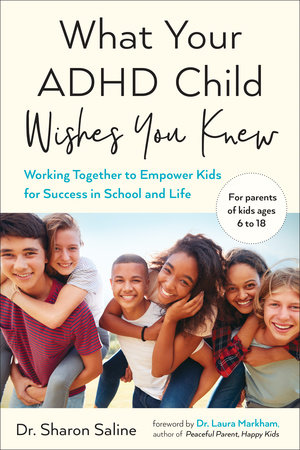Helpful Ways to Support Your ADHD Child’s Reading Journey
by Sharon Saline, Psy.D.
In this excerpt, adapted from What Your ADHD Child Wishes You Knew, Dr. Sharon Saline shares some important steps you can take to help your ADHD child overcome challenges related to reading.
Whether it’s over focusing on a story or avoiding reading as much as possible, hearing what kids say about reading improves your understanding of their experiences. Just like the manager probes his pitcher’s reasons for wanting to stay in the game, you can wonder about reading by considering things related to it: engaging content, English as a Second Language, dyslexia, or slower verbal processing speed. These issues are researched, and effective interventions are available through your school or private tutoring.
The first, most important step is making sure your child has been properly assessed for any reading disabilities and determining with the school if they are receiving appropriate instruction and accommodations. If they qualify for a reading, speech, or language disability, they will need special interventions to help them improve their skills and support to accept their learning differences. These interventions will occur at school but may also require supplemental help. Even without a diagnosis, though, reading can be unpleasant for kids with ADHD, especially if the material is not inherently interesting.
Finding creative ways to practice and enjoy reading can be a can of worms. You’ve probably tried a hundred different ways to make this happen. The goal here is reading anything (except inappropriate material) that is engaging and interesting enough for them to do it. They may or may not like it. The manager makes sure the team players are in good physical condition so they can play baseball strong and hard. They may or may not like fitness exercises, but they do them in service of the larger goal of being in shape to play well. Your goal is to make sure your child knows how to read proficiently. Then, hopefully, reading will be less arduous and more pleasurable in the future, but who knows? Not everyone likes reading, and your child can still be successful in the world without it being a passion or even a hobby. You have to focus on the now first. Minecraft books; joke books; graphic novels; two-minute mysteries; magazines about sports, music, fashion, or other interests; the daily newspaper — time spent pursuing any of these should qualify in your home as reading.
Reading at school can be especially difficult, and you may want to use alternative approaches. Perhaps your son is more of an auditory learner and likes to hear books on tape. You could supplement visual reading with listening to a text. Maybe your daughter needs shorter reading assignments that better match her attention span and processing speed with a wider range of topics to make them more appealing. As the manager, step in and discuss these options with your child and their teachers, advocating for a way to make reading accessible and tolerable. One boy I know loves nonfiction but dislikes fiction. His sixth-grade teacher wanted the students to read a novel for their book report. He and his parents had been arguing about this assignment because he “couldn’t find anything good.” We talked about finding a novel that read like nonfiction: something historical or a fictional biography. His teacher helped him find one, and everyone was pleased.
Don’t give up — problem-solve.
-
Get the Book:
-
What Your ADHD Child Wishes You Knew: Working Together to Empower Kids for Success in School and Life
Available from:Also available from:

